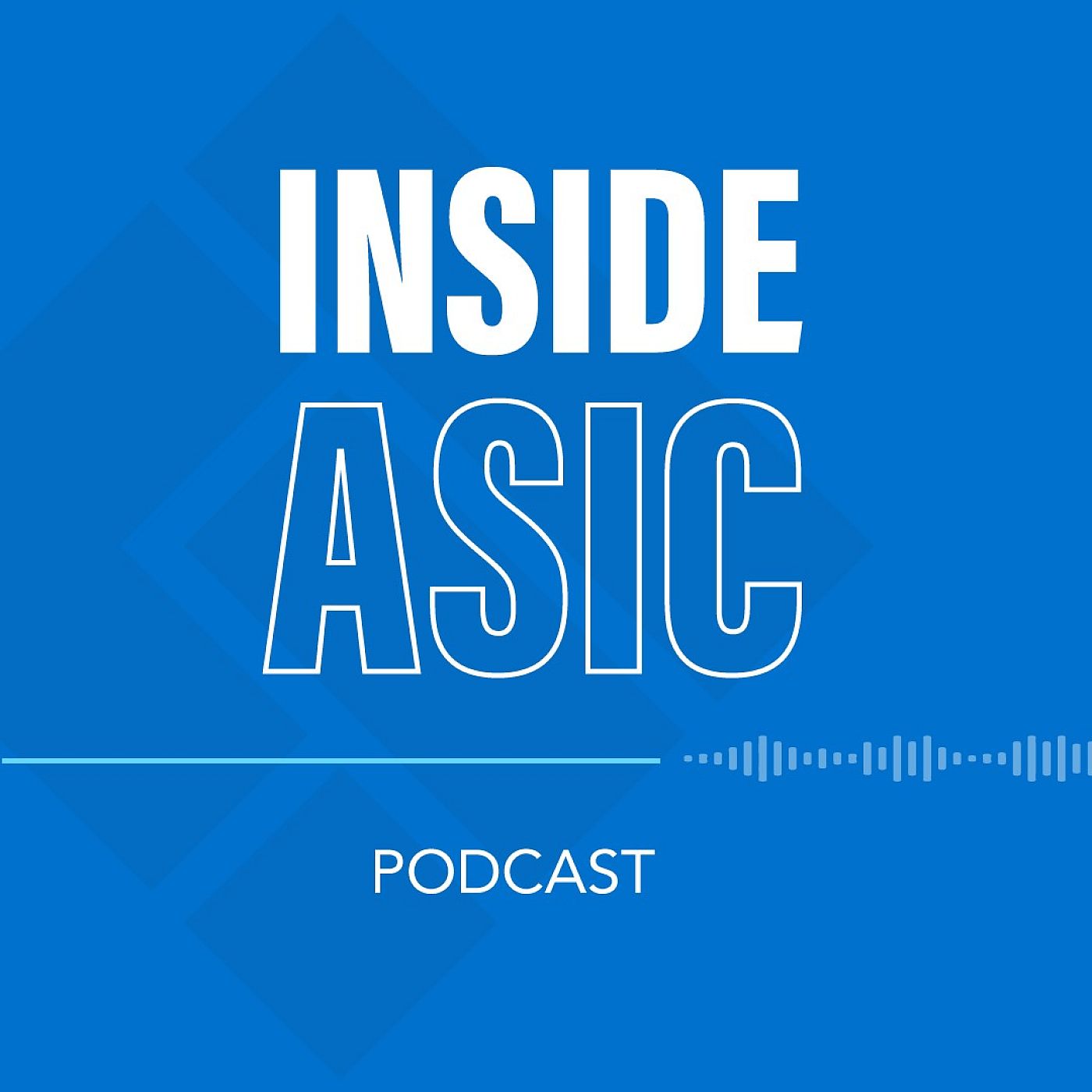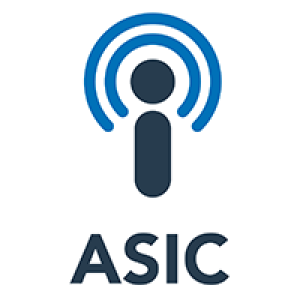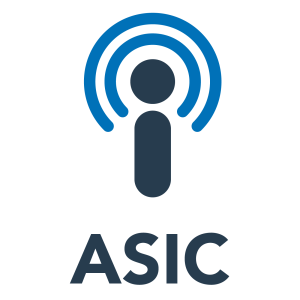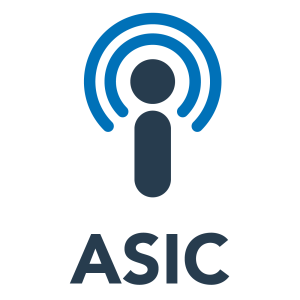
The official podcast of the Australian Securities and Investments Commission (ASIC). The Australian Securities and Investments Commission is one of the busiest law enforcement agencies in the country. In Inside ASIC we look at what it takes to keeps the financial markets and consumers safe. The podcast gives insight into the workings of ASIC and hears from the people involved. Each episode of the podcast showcases a different area of the work of our people as told by our staff, plus interviews with Commissioners and external guests. You’ll hear from key players inside ASIC on everything from protecting consumers from increasingly sophisticated scams to cracking down on greenwashing and holding super funds to account. The latest series of Inside ASIC is here: https://open.spotify.com/show/2itvIwJWHm5qhws9Z8dyiT?si=zHeqtwVdRqSHShBKZkjSZQ
Episodes

Wednesday Jul 10, 2019
Episode 51: ASIC's case against former financial adviser James Gibbs
Wednesday Jul 10, 2019
Wednesday Jul 10, 2019
On 10 July 2019, ASIC’s case against James Gibbs came to a close and he was sentenced to 10 years imprisonment, with a non-parole period of seven years to serve.
James Gibbs stole $4.88 million from his clients when he was acting as their financial adviser. His clients trusted him with their savings, with their money to be used for their retirements, and he devastatingly broke that trust by using that money for his own purposes.
In this episode, we hear from Dallas, one of Mr Gibbs' victims who helped build ASIC's case, as well as ASIC investigator, Chris Rowe.
Read ASIC media release's for more information: 19-179MR Former Adelaide financial adviser sentenced to 10 years imprisonment

Wednesday Jun 26, 2019
Episode 50: Balancing consumer choice and protection
Wednesday Jun 26, 2019
Wednesday Jun 26, 2019
In this interview with the Chair of the European Securities and Markets Authority Steven Maijoor, ASIC Commissioner Sean Hughes explores the balancing act between consumer choice, innovation and consumer protection and the use of product intervention powers by regulators around the world.

Tuesday Jun 25, 2019
Episode 49: ASIC's case against hacker Steven Oakes
Tuesday Jun 25, 2019
Tuesday Jun 25, 2019
A man sits outside an office building on his laptop. He keeps to himself and passers-by don’t really notice him. He has been outside this office building before, but he is not interested in going inside. Unknown to those around him, and the company operating inside the building, this man is inside their network, accessing confidential information and reading their emails. He’s after inside information.
Steven Oakes was sentenced on 25 June 2019 in the County Court at Melbourne to a total effective sentence of three years imprisonment, and ordered that he be released after serving 18 months of the term of imprisonment, on his own recognisance to be of good behaviour for 18 months, after pleading guilty to a total of 11 charges for insider trading, unauthorised access to data with the intention to commit a serious offence (insider trading) and the alteration of electronic devices required by ASIC.
In this episode, we hear from the investigators behind ASIC’s case - Peter Ridgley and Anthony Vardy.
For more information about ASIC's case, read our media release (19-153MR) and download an infographic on our website.

Monday Jun 24, 2019
Episode 48: International standard setting for insurance supervisors
Monday Jun 24, 2019
Monday Jun 24, 2019
In this interview with the Secretary General of the International Association of Insurance Supervisors (IAIS) Jonathan Dixon, ASIC Executive Director (Financial Services) Michael Saadat explores the role of the international standard setting body for insurance regulators - the IAIS, its priorities and challenges, and the impact of advancements in technology on regulation.

Friday May 10, 2019
Episode 47: The power of a ponzi scheme
Friday May 10, 2019
Friday May 10, 2019
In this episode we take you behind the scenes of a ponzi scheme, where unbelievably good returns are offered to investors, the scheme operator seems to be trustworthy – but it’s all smoke and mirrors.
ASIC investigators Kaan Finney and David McArthur explain how ponzi schemes work, how operators attract investors, how ASIC investigates and shuts down these schemes and most importantly, how can you can avoid getting caught up in a scheme.
A ponzi scheme is an investment scam where the promoter convinces people to invest in the scheme. Money is deposited by early investors and used to pay the first round of returns. However, new money invested is used to pay older returns to investors. People are led to believe there is an investment because of this when often there actually is no investment at all or the investment is not what they think it is.
There are practical tips on how to avoid ponzi schemes and other types of investment scams on ASIC’s MoneySmart website or you can subscribe to our media releases to find out about the latest matters we are investigating at ASIC.
And if you have feedback on this podcast, we’d love to hear your thoughts. Send us a tweet to @ASICmedia

Tuesday Apr 09, 2019
Episode 46: ASIC enforcement update July to December 2018
Tuesday Apr 09, 2019
Tuesday Apr 09, 2019
ASIC has today released its enforcement update report for the period 1 July 2018 to 30 December 2018.
A copy of the report - outlining key actions taken over the past six months to enforce the law and support our enforcement objectives - can be found here.
The report also covers ongoing areas for particular focus, including ASIC Deputy Chair Daniel Crennan QC’s discussion of recent reforms enabling ASIC to pursue harsher civil penalties and criminal sanctions against banks, their executives and others who have breached corporate and financial services law.

Monday Apr 08, 2019
Monday Apr 08, 2019
ASIC has welcomed the passage of key financial services reforms contained in the Treasury Laws Amendment (Design and Distribution Obligations and Product Intervention Powers) legislation introducing:
- a design and distribution obligations regime for financial services firms; and
- a product intervention power for ASIC
The design and distribution obligations will bring accountability for issuers and distributors to design, market and distribute financial and credit products that meet consumer needs. Phased in over two years, this will require issuers to identify in advance the consumers for whom their products are appropriate, and direct distribution to that target market.
The product intervention power will strengthen ASIC’s consumer protection toolkit by equipping it with the power to intervene where there is a risk of significant consumer detriment. To take effect immediately, this will better enable ASIC to prevent or mitigate significant harms to consumers.
These reforms were recommended by the Financial System Inquiry in 2014 and represent a fundamental shift away from relying predominantly on disclosure to drive good consumer outcomes.

Tuesday Mar 26, 2019
Tuesday Mar 26, 2019
Mr Nakhl engaged in dishonest conduct and was found guilty in the District Court of New South Wales. The court set Mr Nakhl a non-parole period of 6 years.
View the ASIC media release (19-055MR) for more information
Mr Nakhl was convicted on eight charges (18-178MR), brought by ASIC, of engaging in dishonest conduct with investor funds. The conduct affected 12 investors while Mr Nakhl was a representative of Australian Financial Services Limited (in liquidation) and as sole director of SydFA Pty Ltd (deregistered).
The court found Mr Nakhl advised clients to set up self-managed superannuation funds and to invest their superannuation and other funds in products such as shares, managed funds and high interest rate bank accounts. Rather than investing the 12 investors’ funds in these products, Mr Nakhl used these funds 'as he pleased' and for his own purposes.
Mr Nakhl then lied to the investors, telling them that he had invested their funds in accordance with his advice and that their investments were performing well. Mr Nakhl also tried to cover up his wrongdoing by having these 12 investors sign documents that supposedly authorised Mr Nakhl to use the funds in the way he did.
These 12 investors allowed Mr Nakhl to invest approximately $6.7 million on their behalf. Mr Nakhl lost approximately $5.1 million of these invested funds.

Thursday Oct 11, 2018
Episode 43: Climate risk disclosure
Thursday Oct 11, 2018
Thursday Oct 11, 2018
ASIC Commissioner John Price joins the podcast to discuss ASIC’s review of climate risk disclosure by listed companies in Australia.
You can read the full transcipt below.
TRANSCRIPT
HOST: Hello, and welcome to the official podcast of the Australian Securities and Investments Commission.
In today's episode, we'll be discussing ASIC’s review of climate risk disclosure by listed companies in Australia.
My name is HOST Heilbuth and with me this time around is ASIC Commissioner, John Price. John, thanks for your time.
JOHN: Thanks very much.
HOST: Before we talk about ASIC’s report, can you define what we mean by climate risk?
JOHN: A global Task Force on Climate-related Financial Disclosures puts climate-related risks into two main categories.
The first is risks related to the transition to a lower-carbon economy. The transition includes policy, legal, technology and market changes – and this presents a number of risks to Australian companies.
The second is a series of risks related to the physical impacts that result from climate change. This can be extreme weather and shifts in climate patterns, such as sea level rises and sustained higher temperatures.
HOST: What role does ASIC play in this space?
JOHN: Firstly, we are very focussed on encouraging strong and effective corporate governance. We consider the management of issues such as climate change begins with good corporate governance. Within listed companies, this should be led by directors and senior management. Companies that have effective corporate governance practices are better equipped to develop and implement effective strategies to manage risks and opportunities, and that of course includes climate risk.
Secondly, we are also focussed on disclosure. Where the law requires it, ASIC is focussed on making sure that companies disclose material climate change risks. Disclosure of risks – like climate change and other risks – helps investors to be better informed when they make their important investment decisions.
HOST: ASIC’s surveillance project examined how listed companies disclose climate risk. What did ASIC find?
JOHN: What we found is that listed companies need to do more to comply with their disclosure obligations, especially outside of the top-200 listed companies.
Of the 60 listed companies in our ASX 300 sample, when we did our work around climate change, 17% identified climate risks as material risk to their business.
While most of the reviewed ASX 100 entities had considered climate change risk to the company’s business, at least to some extent, disclosure practices were fragmented, inconsistent and patchy.
As part of our surveillance, it was often difficult to know whether general references to climate change risk related to physical or transition climate risks, or both.
These fragmented climate risk disclosure practices, we think, make it difficult for investors to compare between companies.
HOST: What can listed companies do to properly disclose climate risks? What do we expect to see from business?
JOHN: We recognise that climate risk disclosure practices are still evolving (not only here in Australia but internationally). What we do recommend is that directors and advisers of listed companies consider climate risk both as a short-term and a long-term risk, and directors and officers also continually reassess existing and emerging risks and how they apply to the company’s business.
Also, listed companies need strong and effective corporate governance. This includes active and informed engagement by the board. Boards play a critical role to identify and manage risk.
And finally, it goes without saying that listed companies must comply with the law. Directors of listed companies should carefully consider the requirements relating to operating and financial review – or the OFR as it’s commonly called – as it prescribes certain disclosures under the Corporations Act.
In fact, the law requires an OFR to include a discussion of climate risk when it could affect a company’s achievement of its financial performance or desired outcomes. Depending on the circumstances, disclosure of climate risk may also be required by the law in other circumstances, such as in a fundraising document like a prospectus or in a continuous disclosure announcement.
HOST: And John, can you tell us what type of information must be disclosed to investors?
JOHN: Listed companies should disclose useful information to investors – that’s the first rule of thumb. The voluntary disclosure recommendations issued by a body called the TCFD are specifically designed to help companies produce information that is useful for investors.
We do not consider there is any legal or policy impediment to listed companies reporting under TCFD recommendations provided that the disclosure is not misleading or deceptive and is based on appropriate evidence available at that time.
We also recommend that listed companies with material exposure to climate risk consider reporting under the TCFD framework. In March 2018, the Australian Government released its response to a 2017 report on Carbon Risk issued by the Senate Economics References Committee.
The Government, in that response, encouraged stakeholders to consider the final TCFD report and its various recommendations.
ASIC is closely monitoring developments and we will continue to look at this closely as market practice develops over time.
HOST: Where can listeners find more information?
JOHN: I’d strongly encourage people to refer to ASIC’s REPORT 593 on Climate risk disclosure by Australia’s listed companies can be downloaded from our website – asic.gov.au
HOST: Thanks John. And we’ll be back with another episode of ASIC’s podcast shortly.

Wednesday Sep 19, 2018
Episode 42: Registered liquidators and creditors
Wednesday Sep 19, 2018
Wednesday Sep 19, 2018
Nisansala Peries from ASIC’s Insolvency Practitioners team and Michelle Jakubauskas from ASIC’s Behavioural Research and Policy Unit join the podcast to discuss one way registered liquidators can help people who are owed money by a business (creditors) to navigate the complex landscape of an external administration. Download the letter and read more at asic.gov.au.
